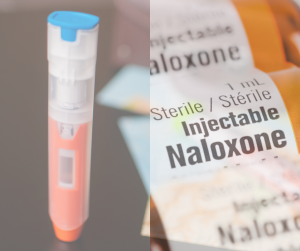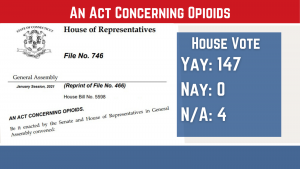Opioid Antagonists and Emergency Usage | Peer Navigator Pilot Program | Assisting Victims of Domestic Violence | and More Info.
Posted on June 6, 2021

Law Enforcement to Receive Training in Opioid Antagonists and Usage in an Emergency
Today, the House voted unanimously in support of a bill that will help save lives.
SB-1011, An Act Concerning the Use of Opioid Agonists and Epinephrine Cartridge Injectors by Police Officers. This bill will require law enforcement officers by trained in using opioid antagonists (i.e. Narcan) and also maintain a supply of these medications for use when responding to a medical emergency.
The bill also creates a working group to study the feasibility of requiring police officers to carry epinephrine cartridge injectors (i.e. Epi-Pens) and administer them when someone is experiencing anaphylaxis.
To view the bill click here.

Creation of a Peer Navigator Pilot Program
Earlier this week, the House passed HB-5597, An Act Concerning Opioids.
The bill seeks to address the opioid issue through the creation of a peer navigator pilot program. These peer navigators will provide nonmedical mental health care and substance use services to individuals with an opioid use disorder in which the pilot program is established (up to five urban, suburban and rural communities).
The bill requires each community participating in the pilot program to form a team of at least two peer navigators to work to:
- increase engagement between individuals with opioid use disorder and providers of treatment, healthcare and social services;
- improve the retention of these individuals in opioid use treatment by addressing their social determinants of health and emerging local conditions that affect these determinants; and
- increase the community’s capacity to support these individuals by identifying and addressing systemic barriers to treatment, health care, and social services and social support.
The bill will now move onto the senate for further action.

Republican Initiative to Assist Victims of Domestic Violence Passes House
Last week, the House voted unanimously in support of a bill I co-sponsored and a House Republican priority – to expedite immediate assistance to victims of domestic violence.
HB-6520 increases protections for victims of domestic violence by providing 90 days of temporary benefits for federally-funded programs like temporary family assistance (TFA), and state administered general assistance (SAGA), regardless of household income.
By waiving income factors associated with these programs, we are ensuring victims can free themselves and their children from their abusers.
During the public hearing on the bill, it received the endorsement from the Connecticut Coalition Against Domestic Violence (CCA | DV) and unanimous support from the Human Services Committee.
The bill will now move onto the senate for further action.
To view the bill, click here.

Owner Liability for Removing a Fallen Tree Limb
The House has recently passed HB-5598, An Act Concerning a Property Owner’s Liability for the Expense of Removing a Fallen Tree or Limb, a bill I’ve co-sponsored which establishes conditions under which a private real property owner (“land owner”) is presumed liable for the expenses of removing a tree or tree limb that fell from his or her property onto an adjoining private owner’s land.
A private land owner is presumed liable for the expenses of removing a tree or tree limb that fell from his or her property onto an adjoining private owner’s land if, before the tree or limb fell:
- a licensed arborist inspected the tree and documented that the tree or limb was diseased, decayed, or damaged and likely to fall within five years of the inspection date;
- the adjoining private property owner notified the land owner of this determination and requested that the land owner cure the condition by any appropriate method (including removing, pruning, or spraying the tree); and
- the land owner failed to do so within 90 days after receiving this notice.
To read more on this bill, click here.
The bill will now move onto the senate for further action.